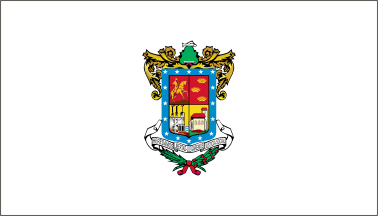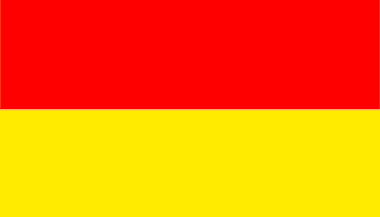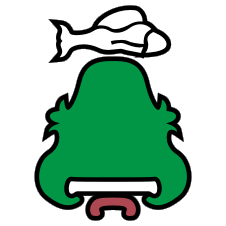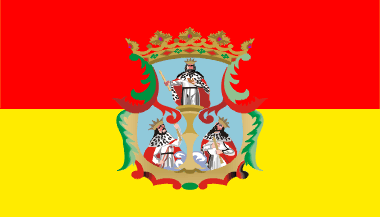

Last modified: 2005-05-07 by juan manuel gabino villascán
Keywords: mexico | michoacán de ocampo | morelia | coat of arms | unofficial flag |
Links: FOTW homepage |
search |
disclaimer and copyright |
write us |
mirrors

|
4:7 |
| by Juan Manuel Gabino Villascán, October 06, 2001. | |
| See: Coat of arms of white bakground: unofficial flags |
INEGI and SEP
Reported by Juan Manuel Gabino Villascán, October 06, 2001.
.gif)
by Juan Manuel Gabino Villascán, February 21, 2001.
Useful information in Spanish about the Michoacán de Ocampo coat of arms could
be found here: Universidad de Michoacana - Panorama de Michoacán
Quoted byJuan Manuel Gabino Villascán, February 20, 2001.

There are states that have unofficial flags simultaneusly appreciated jointly
with the National, e.g. Jalisco, and Yucatán.
In Michacán, there is also a flag featured by two horizontal
stripes red over yellow. This flag has been seen flaying over public buildings.
Arnoldo Hernández, December 10, 1991.
Red and yellow are typical in the state. They are the official ones used by the
former football club "Atlético Morelia S.C", now called "Monarcas Monarcas
F.C". The Michoacán sports youngs who participate in National Youth and
Children Games; in addition to the under-18 State Amateur football team, use
all also yellow and red. However, it should be said, that several flags with
those colors and in a different
disposition, were flown in many places, incluiding public buildings, when
"Atlético Morelia FC" won the Football Championship in Mexico a year ago.
On the other hand, the Michoacán laws say nothing about "state colors", unlike
Jalisco's. In adition to that, the Michoacán
official web-site employs green and
white, while that of Jalisco
uses the State colors: blue and yellow.
It should be considered also that yellow and red could be representative
of the Municipality of Morelia rather than the State.
Juan Manuel Gabino Villascán, December 10, 2001.
Michocán: Aztec emblem (glifo) for Michoacán

by Juan Manuel Gabino Villascán, December 21, 2002.
In the pre-hispanic times, the Empire of Michoacán had
a "coat of arms"; it was of mexica (aztec) origin, and
was the representation of the Empire's name:
Michoacán of the nahuatl words "Michi" what means
fish, and "can" what means place, so Michoacan may be
translate like "place of fishermen","place of fish
abundance", or "place of fish". Such an emblem is the crest
of the current State arms.
Daniel Rosas, February 16, 2002
It is said also that this was used on pantlitl
(plural of pantli, the Nahuatl word for flag).
This emblem is used as a crest in the present-day Michoacán de Ocampo
coat of arms.
Daniel Rosas, February 16, 2002; and
Juan Manuel Gabino Villascán, February 19, 2002.
Michocán: Colonial flag and coat of arms (1541-1821)
During Habsburg rule, in La Colonia, mostly of the territory cunrrently composes
Michoacán de Ocampo was named of Kingdom of Michoacán (Reino de
Michoacán), then Province of Valladolid de Michoacán with the Borbon.
Daniel Rosas, February 16, 2002.

|
4:7 |
| by Juan Manuel Gabino Villascán, February 19, 2002. |
The colonial flag with the arms in the center was created for the province.
It was used until the fall [March 19, 1823] of Iturbide [as Michoacán flag],
and forbidden (by the republicans) because of
its "Hispanic" colors. It became to be used once more but as
symbolic of the city [Morelia] about its 450th anniversary
(1991) of its foundation. The flag is currently hoisted in the
city's square and other several public buildings.
This information was gotten by means of a person dedicated to study the
city's history.
Daniel Rosas, February 16, 2002.
![[Coat of arms of the Province of Morelia/Valladolid de Michoacán]](../images/m/mx-mrl)o.gif)
by Juan Manuel Gabino Villascán, February 19, 2001.
In 1537 a group of Spanish families, wanted to move on another place, and left
the ancient province capital, Pátzcuaro, and requested to the Spanish crown,
the territory for their new city, and in 1541,
Viceroy Don Antonio de Mendoça (old Spanish for Mendoza), gave the permission for
building the new capital, in the valley of Guayangareo.
Valladolid was founded in 1541, and Emperor Chearles I of
Spain, V of Germany, granted a coat of arms to the city and the kingdom.
Such coat of arms is:
"...made up into three parts; each with a king, crowned and dressed in purple, on a gold field, holding each a scepter. A royal crown as a crest with inlaid jewelry in blue, red, and green. As mantling black and gold plants with all their branches..."
Daniel Rosas, February 16, 2002.
![[Unidentified flag in Michoacán]](../images/m/mx-mic-u.gif)
![]()
by Juan Manuel Gabino Villascán, May 20, 2002, as described by
James Abraham.
I am trying to determine the meaning of a flag which is
depicted in a
mural in a small church in Michoacan, Mexico. It is held by a
figure who is
probably a Christian descendent of Montezuma, and it shows a sun-face
superimposed on a St Andrew's cross. If you were trying to
find out about
this flag, what approach would you take? What resources or
archives would
you consult?
James Abraham, December 7, 2001.